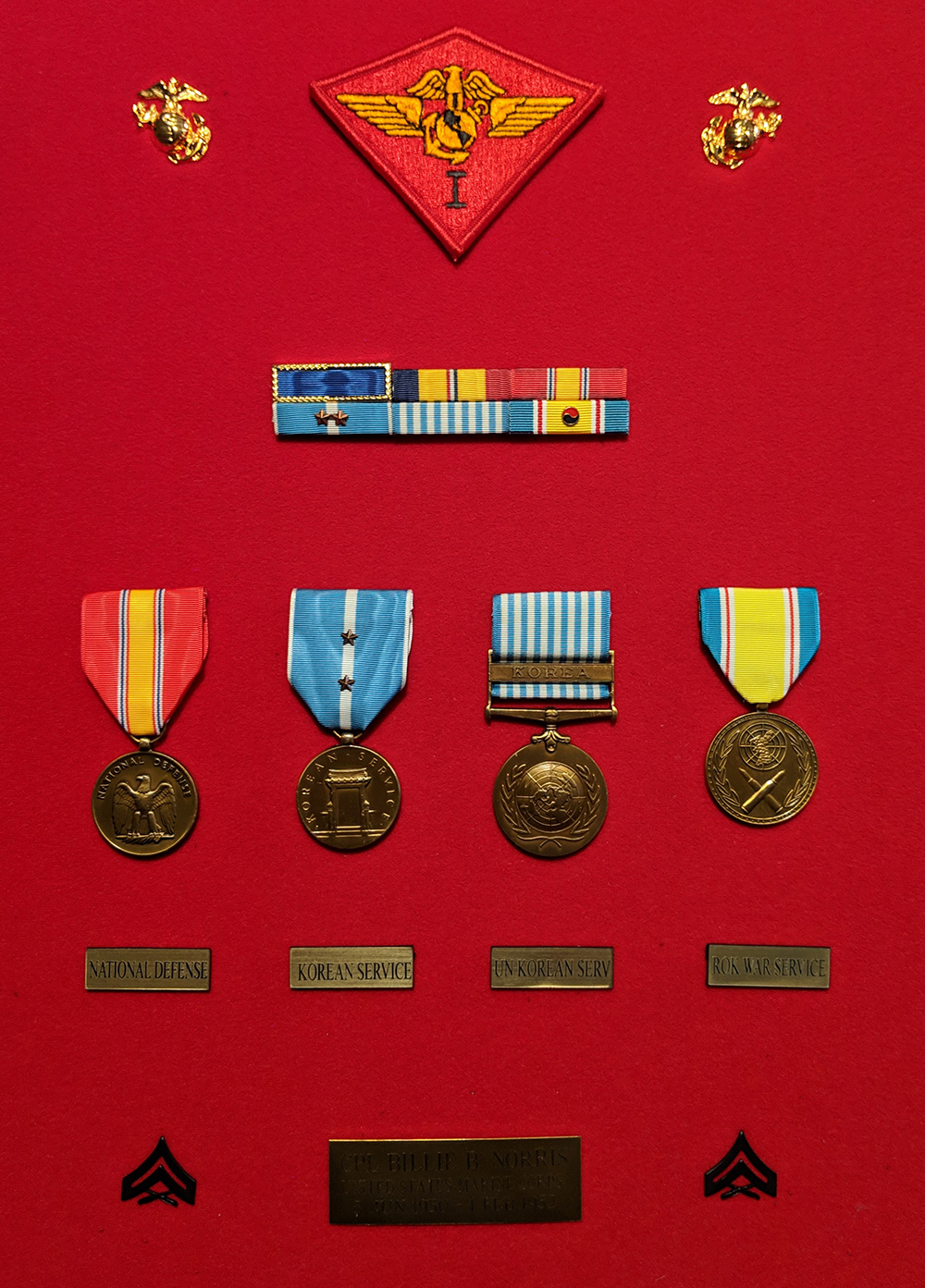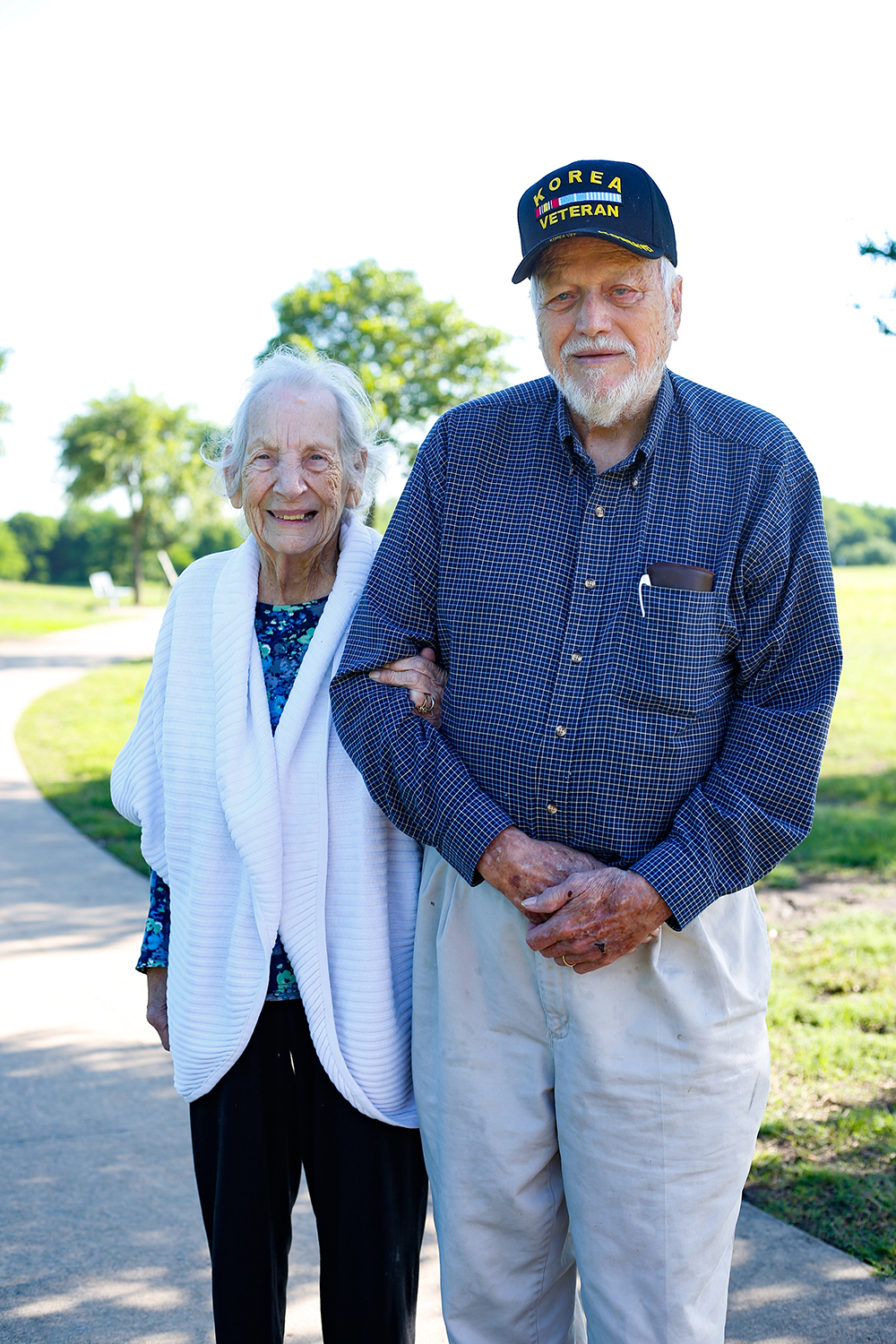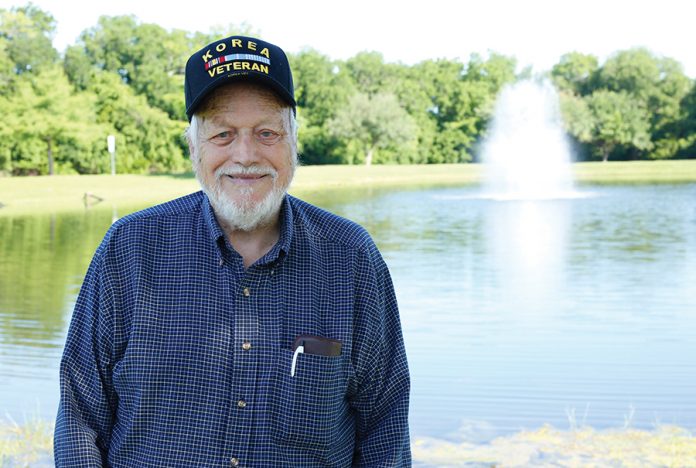Imagine, if you will, the town of Frisco in 1929, back when its population was around 600 people. And just north, somewhere between Pilot Point and Celina, in the sweltering heat of August 18, Bob Norris was born. A seemingly commonplace event, but each person has a unique life path, brimming with stories you might miss if you do not take the time to stop and listen. And with nearly 90 years of life under his belt, Mr. Norris has quite a few stories to tell.
Life for Mr. Norris began simply enough on Pope’s Ranch. A small chapel on the ranch, known as Chains Chapel, served as the one-room school house where all 15 students spanning seven grades were taught by one school teacher. Air conditioning was an open window. Heat was a coal-burning stove. And the restroom … you would pick your respective side of the outdoor “two-holer john.”
“We had to ride a horse to school, and I hated it,” Mr. Norris recalls. “I would ride that horse to school and tie him up, and he would rub the bridle off and go home without us. And we would have to walk home and carry the saddle!”
In the 1940s, Texas changed its required grades from 11 to 12, and that allowed Mr. Norris to inadvertently skip a grade. He finished eighth grade in 1941, at the Alla Hubbard School, a location on which Celina’s current high school now sits. During that year, specifically on December 7, 1941, immediately after the attack on Pearl Harbor, the principal/superintendent of the Alla Hubbard School District was called from the Navy reserves to active duty. Eventually, “he was one of the naval officers that accepted one of the German battleship surrenders,” Mr. Norris shares.
Rural high school life in Celina was far from the war, and Mr. Norris enjoyed competing against Frisco as the pitcher and captain of Celina’s baseball team and as the captain and all-conference center on Celina’s basketball team. “Both schools’ primary players were farmers’ sons who had to go home early in the afternoon to work and could not stay to do all this extra practicing that goes on now,” he says.
 At home, his chores included milking cows, taking care of the pigs and farming with mules. The family did not get a tractor until 1945. “My daddy told us if we were ever able to pick 200 pounds of cotton during the day we could quit and rest. I worked out a deal with him so I could get a job someplace else, buy my own school clothes and not have to pick cotton,” Mr. Norris says. “I made the statement that I was not going to grow up on the farm and cut cockleburs and sunflowers the rest of my life. I was going to get an education and work.”
At home, his chores included milking cows, taking care of the pigs and farming with mules. The family did not get a tractor until 1945. “My daddy told us if we were ever able to pick 200 pounds of cotton during the day we could quit and rest. I worked out a deal with him so I could get a job someplace else, buy my own school clothes and not have to pick cotton,” Mr. Norris says. “I made the statement that I was not going to grow up on the farm and cut cockleburs and sunflowers the rest of my life. I was going to get an education and work.”
So, after working at the local grocery store and as a suction hand at the local cotton gin, Mr. Norris saved $639 for college by the time he graduated high school in 1946, at the age of 16.
After one semester at The University of North Texas (UNT), he had used up half of his hard-earned money on “room and board, books and that type of thing.” Undeterred from his goal of getting a college education, he decided to work full-time and go to school part-time. He landed a job at Minneapolis-Honeywell Regulator Corporation, now known as Honeywell Inc., and enrolled in night school at Southern Methodist University (SMU). In addition, he joined the U.S. Marine Corps Reserve Unit in Grand Prairie. “My military career was unique in that I was a weekend warrior,” Mr. Norris says. “I went in for military training on the weekends, one weekend a month. Then, I went to a two-week maneuvers active service each summer, while going to school at night and working at Honeywell. I was in Cherry Point, N.C., on maneuvers in July of 1950 when I received my telegram of greetings from the U.S. government ordering me to active duty.”
He reported to Naval Air Station (NAS) Dallas, and within a week, was flown to El Toro, Calif. “I was in the Marine Corps Reserve as a radio radar technician,” he explains. “So, I went to El Toro with that military occupation specification number.”
By mid-August, Mr. Norris was boarding a ship, and 11 days later, found himself in Kobe, Japan. He served as a tech at the Itami Air Base until the end of October, when he was shipped to Wonsan, North Korea, with the Invasion of Wonsan.
“In the marine corps, I do not care what you are, you are a rifleman. If they need you, you are a rifleman,” he recalls. “But, I had qualified on the rifle range before going over there.”
November 10 is the Marine Corps’ birthday. Mr. Norris explains, “Sometime immediately following the 10th, we had an artic blizzard, and 100,000 Chinese came in behind us and cut us off. So, we went north.” Mr. Norris says temperatures dropped to 38 degrees below zero, and neither side was adequately prepared. They had six-man tents with diesel fuel oil stoves, but Mr. Norris and three other men opted to stay out on the perimeter where they were stationed because the “igloo” they had built was warmer than the tents. “He talked a lot about going without food there,” Cheryl Staats, Mr. Norris’ daughter, adds. “I know they ate SPAM®, and he is still been known to eat SPAM!”
“It was bad,” Mr. Norris recalls. “We did not have any foul-weather gear … nothing. Our guns were frozen. We just kind of kicked them and hoped we did not have to use them. The Chinese had the same problem. One group of Chinese, we thought they were all dead, were actually frozen and still alive because their eyes were still moving. And the marines bayonetted them.”
 While sleeping in the frigid cold one night, Mr. Norris was abruptly awakened at 2 a.m. “Our sergeant told us in good ol’ marine-term language to get our butts in gear and that we had been deserted,” Mr. Norris recounted. “The army unit had pulled out and left us there without any guards on duty, and we did not have any way out. There were 20 some odd of us there.”
While sleeping in the frigid cold one night, Mr. Norris was abruptly awakened at 2 a.m. “Our sergeant told us in good ol’ marine-term language to get our butts in gear and that we had been deserted,” Mr. Norris recounted. “The army unit had pulled out and left us there without any guards on duty, and we did not have any way out. There were 20 some odd of us there.”
Luckily, their sergeant radioed headquarters and succeeded in commandeering an airlift to Yonpo, North Korea. “They flew an R4D, which is an old engine-driven C-47, and picked us up the next morning about sun-up,” Mr. Norris recalls.
“I was in Yonpo when General MacArthur flew in to meet with the army general to decide how we were going to get out,” Mr. Norris points out. “When they said we had to retreat, our General Smith said, ‘Retreat, hell! We are advancing to the rear!’”
In what Mr. Norris says was the largest evacuation that has taken place since Dunkirk, they trudged their way through snow and mud to the port of Hungnam. “We had about 100 ships, and they carried more than 100,000 Koreans out … plus 30-something-thousand marines. The group I was with left on the Towanda Victory on December 19. With navy ships blowing up around you, you are not going to forget days like that.”
They arrived in Masan, South Korea, then were flown to Japan and told they would never have to go back to Korea … and Mr. Norris has never been back since. “I would not trade a million dollars for the military experience, but I would not take a dime for some more of it,” Mr. Norris says. “I was part of the group known as the Chosin Few,” says Mr. Norris. “The group that was surrounded and cut off at the Chosin (Changjin) Reservoir by the Chinese.”
Indeed, the Frozen Chosin, as they are sometimes dubbed, have been lauded as the prime example of a marine’s strength, devotion and perseverance.
“The Korean War was the forgotten war. People just did not know about it … even back in the days when it was going on. But, it is one of the most historical battles of the Marine Corps,” Mr. Norris says. “The Korean War was a U.N. police action to start with, but they still have not signed an armistice. That is what President Trump and Kim Jong-un are discussing now in their meetings … to have an armistice.”
After enduring North Korea, Mr. Norris stayed in Japan installing radio equipment to update World War II aircraft with modern-day radios and radar at that time. When Mr. Norris returned stateside in December 1951, he immediately proposed to Armetha Brimmage, his now wife of 67 years and namesake of Armetha Norris Elementary School. He married her on February 2, 1952. Even now, his eyes light up as he grabs her hand and talks about that day.
After receiving his separation papers, Mr. Norris went back to work for Honeywell. “My job was there waiting on me like I never left,” he recalls. “Honeywell was an outstanding company. They took care of their reserves that were called up for active duty during that time period. They sent us hand warmers, cribbage games … anything they thought we would enjoy having during the Korean War.”
Not long after Mr. Norris married Armetha, the U.S. government recognized Korea as being a war and extended the G.I. Bill of Rights to Korean Veterans.
This allowed Mr. Norris to return to UNT, attend college full-time and work part-time until he earned his degree in industrial art. From there, he taught school in Dallas for 30 years, from 1955-1985, first as an industrial arts teacher at Thomas J. Rusk Junior High School, then as a science teacher and finally as a vocational education teacher. Along the way, he bought 12 acres of land in Frisco, built a house and moved in with his family in 1960. “Bob Warren was one of the first guys I met here,” Mr. Norris says.
Then, in the summer of 1962, while working to earn his master’s degree in secondary school administration at the Iowa State Teacher’s College, he spent six weeks living in a tent with his wife and two kids (ages four and six) in Blackhawk State Park, Iowa. This garnered attention from The Associated Press. “The AP did a big article about us and the price of education, telling about the couple from Texas that lived in tents in Iowa at Blackhawk State Park to go to school,” Mr. Norris recalls with a laugh.
In 1974, Mr. Norris moved his family to his current home in downtown Frisco. A few years later, while still teaching in Dallas, he convinced Justin Wakeland, his principal at the time, to apply for the superintendent position at Frisco ISD. And as they say, the rest is history.
After retiring from teaching, Mr. Norris went on to serve as a substance abuse counselor in Alaska, worked on construction projects and owned his own lawn and garden center … in addition to a long list of other jobs that has yet to be fully revealed. “We will get tickled because he will mention a job, and we say, ‘I do not think we have heard about that one!’” Ms. Staats laughs. “He is well-educated and well-read. He just knows a lot of things about a lot of things!”
Despite what he knows and what he has seen, Mr. Norris remains grounded and immensely loyal to his family and his wife, rarely leaving Armetha’s side. “They are very devoted to each other,” Ms. Staats says. “Dad is just so loving and takes such good care of her.”
After 90 years of hard work, perseverance and devotion, Mr. Norris has these words for the generations that follow: “I think we live in a wonderful country and the military should be maintained. We should keep a strong military presence. And there should, hopefully, be enough patriotism in the younger group coming on that we do not have to worry too much about the decay of our country. I encourage all of them to appreciate what they have.”


